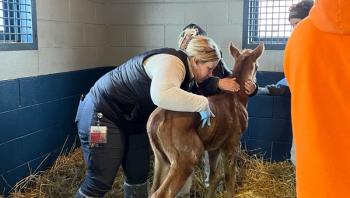
CVMA plans to testify against RVT proposal
Sacramento, calif. ? An April 28 hearing on licensure expansion for registered veterinary technicians (RVT) might prove the California Veterinary Medical Association's (CVMA) best and final chance to thwart the measure.
SACRAMENTO, CALIF. — An April 28 hearing on licensure expansion for registered veterinary technicians (RVT) might prove the California Veterinary Medical Association's (CVMA) best and final chance to thwart the measure.
According to state rule-making guidelines, the California Veterinary Medical Board (CVMB) must hear written and oral arguments pertaining to the proposed addition of new RVT job tasks. Viewpoints on proposals, which opened for comment Feb. 28, will be aired during the formal public hearing next month in Malibu, Calif., marking the latest advance on a year-and-a-half effort to expand RVT duties.
Veterinary proponents of increasing RVT duties say it's the first step toward mirroring the team model of human medicine, while critics view the proposed expansion of duties as dangerous to animal health.
Following the hearing, CVMB plans to debate internally and possibly accept regulatory amendments brought by the board's Registered Veterinary Technician Committee (RVTC), which include limiting the administration of intravenous chemotherapy drugs and anesthesia to RVT licensees by 2012.
Despite the time element, CVMA contests the proposed restriction as well as language, if enacted, would allow RVTs to "create a relief hole in the skin to facilitate placement of an intravascular catheter," replacing earlier verbiage that permitted RVTs to incise the skin.
Any incision, regardless of terminology, is surgery, CVMA leaders argue. Executive Director Valerie Fenstermaker suspects the RVTC's language change stems from efforts to circumvent the veterinary medical practice act, which must be altered legislatively and defines surgery as the practice of veterinary medicine. Lesser regulations are governed by the state's business and professions code.
"They changed 'incision' to 'relief hole,' which is not in the two medical dictionaries I've seen," Fenstermaker says. "In our opinion, any use of a scalpel has risks and is the practice of veterinary medicine. Therefore, this must go through the legislative process, not the business and professions code. If they want to change this, they'll have to do that legally."
Faced with a shortage
That might not be necessary, according to CVMB. At presstime, Executive Officer Sue Geranen confirmed the language is under legal review.
"We changed it after CVMA's comments," she says. "We are having it looked at now, and hopefully we'll have an answer soon. For the general population, these changes don't seem a big deal."
What they attempt to alleviate is an RVT shortage in the state, Geranen says. Proponents of the new tasks view the additional authority as a means for raising RVT earning potential, which could translate to higher recruitment, retention and career satisfaction levels in a state with little more than half the number of licensed technicians as veterinarians.
Yet organized veterinary medicine deems that projection wishful thinking. Considering the state reports just 3,556 RVTs for California's 7,093 resident DVMs, new mandates regarding duties could "paralyze the profession," Fenstermaker says.
"I think veterinarians totally value their RVTs; there just aren't enough of them," she says. "If you mandate them and you can't hire an RVT, consumer costs can go up, and that's ultimately the veterinarian's responsibility."
It's also not the job of the CVMB to address such RVT issues, CVMA President Dr. Eric Weigand says.
"They're here to protect the public, and we don't feel like this is in the best interest of the public at all," he says. "What's good for people and their pets is good for the profession."
The ratification system
That argument will be debated among CVMB members, and there are several ways the vote could go, including failure of the expansion, Geranen says.
But if the measure passes without changes, it will be sent to the California Department of Consumer Affairs for review within 45 days — the initial step beyond CVMB. That agency will have another 45 days to evaluate it, whereby it's sent to the Office of Administrative Law, which submits it to the Secretary of State for publishing in the California Code of Regulations.
Should the board decide to make small modifications such as grammatical changes, a 15-day notice will be released before the measure is sent to the consumer affairs department. Any move to make substantive changes in the language might require another public hearing.
The best-case scenario for the proposal's enactment ranges somewhere between September and October, Geranen says. "Any change could push that back," she adds.
If the changes are adopted, Weigand says CVMA can attempt to repeal the expansion, which he says will amount to an "excessive burden" on practices.
"Ultimately the veterinarian is responsible for patients," he says. "Just because you've delegated something to a technician doesn't change that."
Newsletter
From exam room tips to practice management insights, get trusted veterinary news delivered straight to your inbox—subscribe to dvm360.






